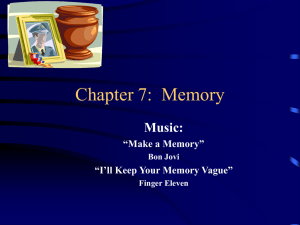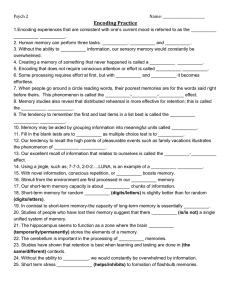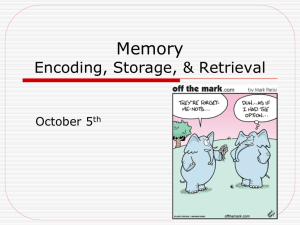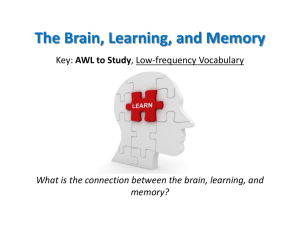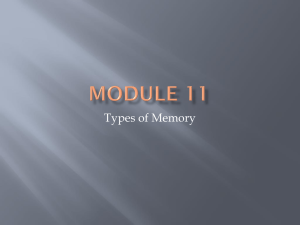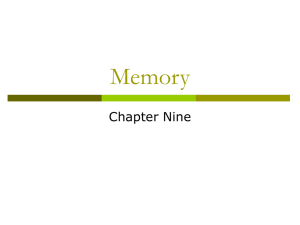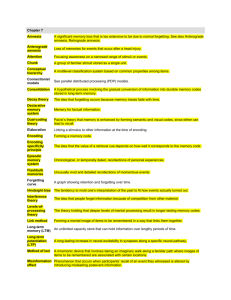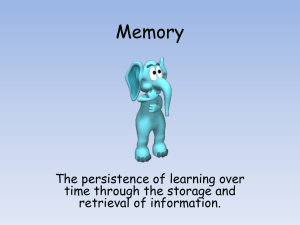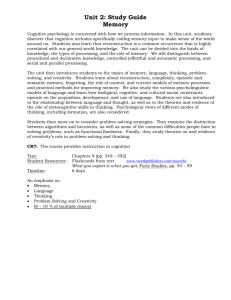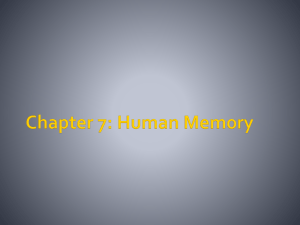Memory
advertisement
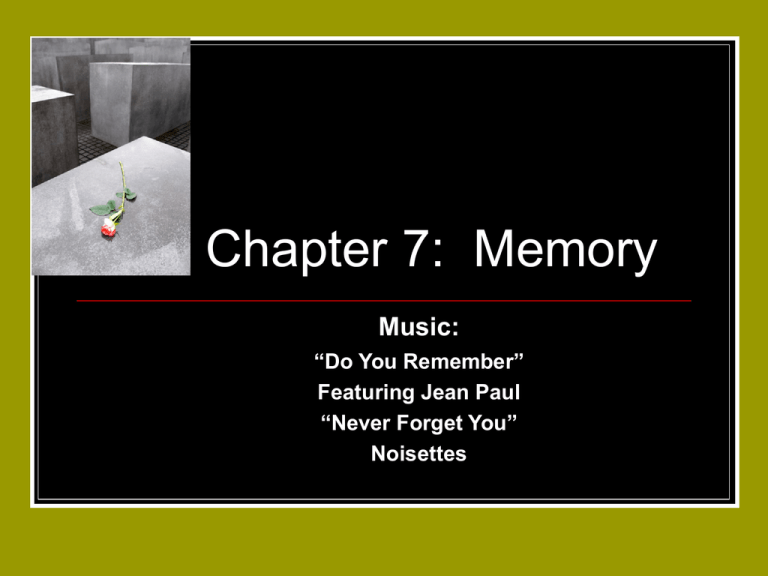
Chapter 7: Memory Music: “Do You Remember” Featuring Jean Paul “Never Forget You” Noisettes Agenda 1. Important information for the next test! 2. The Memory System (i) Sensory Memory From sensory to short-term memory (ii) Short Term Memory From short-term to long-term memory (iii) Long Term Memory Forgetting 3. Eye-Witness Testimonies 4. Application: Improving your memory 5. Movie: Beautiful Minds… (5 min.) 1. Readings for Midterm #2 Chapter 5 “Variations in Consciousness” Chapter 6 “Learning” Chapter 7 “Memory” Chapter 8 “Language and Thought” Chapter 9 “Intelligence and Psychological Testing” Delete pages 329-344 (Language) Delete pages 369-375 Evaluation: Midterm #2 will be worth 20% of your final grade Same format as Midterm #1 Start studying now! 2. The Memory System Fig. 7.6 p. 290 2. Three Key Processes in Memory 2. (i) Sensory Memory • Stores a perfect picture of the world, but for a fraction of a second • • See Sperling’s studies p. 290 Iconic (visual) and echoic (auditory) sensory memories 2. (i) Sperling’s Studies From Sensory to Short-Term Memory How does information get encoded and transferred onto the memory system? a) Automatic processing No effort required See implicit memories p. 312 b) Effortful processing Pay conscious effort and attention to hold info. In short-term memory See explicit memories p. 312 2. (ii) Short-Term Memory Semi-permanent storage Magic number: 7 (+ - 2) Information is lost after 20-30 seconds unless it is rehearsed Maintenance rehearsal keeps the information there… Elaborative rehearsal brings the information to long term memory Type of encoding: p.287 Type of Encoding 2. (ii) Type of encoding, p. 287 2. (ii) From Short-Term to LongTerm Memory What helps us remember?? a) Type of encoding b) Self-referent encoding (self-schema) c) Imagery d) Mnemonics: method of loci Acronyms: e.g. Roy G. Biv 2. (ii)…To long term memory e) Chunking: e.g. 1-4-9-2-1-7-7-6-1-8-1-2 (1492) (1776) (1812) f) Organize information hierarchically g) Spacing effects: distributed practice leads to better long-term retention h) Time: over learn! i) Mood-dependent effects 2. (iii) Long Term Memory Where information is stored in relatively permanent form Capacity is seemingly infinite! 2 memory systems: p. 313 Declarative: Semantic (explicit memories/encyclopedia) Episodic (implicit memories/autobiography) Non-declarative, procedural “how to”; implicit memories based on practice or habit 2. (iii) Independent Memory Systems p. 313 2. (iii) Forgetting Major reasons: a) failure to encode b) stored memories decay c) retrieval failure d) interference: Proactive and retroactive p. 304 2. (iii) Forgetting: Interference p. 304 2. (iii) Forgetting: The Story of HM The most famous and studied amnesiac Anterograde amnesia (p. 311) 2. (iii) Forgetting e) Motivated forgetting: Freud’s concept of repression Repressed memory controversy p. 305-308 3. Eyewitness Testimony A case of constructive memory Discussed by professor in class Another illustration with Loftus http://www.youtube.com/watch?v=_RLvSGYxDIs&feature=fvw Conclusion: “Memories” for non-existent objects can be implanted Memory is surprisingly unreliable 4. Improving your Memory a) Pay Attention! b) Distributed practice And over learn Take your time, and take time c) Engage in deep processing Make information personally meaningful Link to previously acquired knowledge d) Organize information hierarchically e) Learn through several modalities Provide examples for yourself E.g. use visual imagery (2 codes is better than 1) f) Use mnemonics (where useful) g) Minimize interference 4. Movie: Beautiful Minds... An amazing case of perfect photographic memory. (5 min.) http://www.stumbleupon.com/su/2MBBxU
